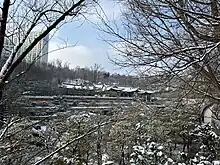| Heungcheonsa | |
|---|---|
 The temple in winter (2024) | |
| Religion | |
| Affiliation | Jogye Order, Korean Buddhism |
| Location | |
| Location | Donam-dong, Seongbuk District, Seoul, South Korea |
| Geographic coordinates | 37°35′54″N 127°00′33″E / 37.598242°N 127.009228°E |
| Website | |
| www | |
| Korean name | |
| Hangul | 흥천사 |
| Hanja | |
| Revised Romanization | Heungcheonsa |
| McCune–Reischauer | Hŭngch'ŏnsa |
Heungcheonsa (Korean: 흥천사) is a Buddhist temple of the Jogye Order in Donam-dong, Seongbuk District, Seoul, South Korea.
Daebang Hall, one of the buildings in the temple, is a National Registered Cultural Heritage of South Korea.[1]
The first predecessor to the current temple was built in 1396, during the reign of King Taejo in the early Joseon period. It was originally built in Jeong-dong near Gyeongbokgung, to the east side of the tomb of Queen Sindeok, who had died in the previous year.[2][3] It was made the head temple of the Jogye order.[2] A three-story pavilion was constructed in June 1398. In December 1504, the temple burned down due to a conflict between Confucian and Buddhist scholars.[3][2] A large bell for the temple was moved to the palace Deoksugung, where it now remains, and is now National Treasure No. 1460.[3][2] In 1569, the temple was rebuilt in a different location. In 1794, the temple was moved to its current location, and renamed to Sinheungsa (신흥사; 神興寺).[2] In 1865, under the reign of King Gojong, it was renamed to its current name.[2]
See also
References
- ↑ "Daebang Hall of Heungcheonsa Temple, Seoul - Heritage Search". Cultural Heritage Administration - English Site. Retrieved 10 January 2024.
- 1 2 3 4 5 6 "흥천사(興天寺)". encykorea.aks.ac.kr (in Korean). Retrieved 10 January 2024.
- 1 2 3 "도심 속 몸과 마음의 쉼표가 되어주는 절, 흥천사 여행". mediahub.seoul.go.kr (in Korean). Retrieved 10 January 2024.